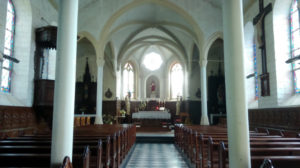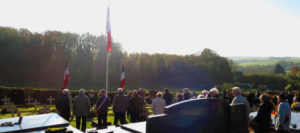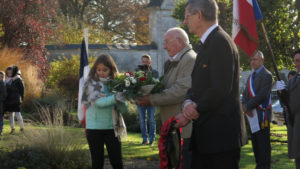We have never been ones to make our way to Whitehall on Remembrance Sunday in order to watch the ceremony at the Cenotaph.? We would buy our poppies and remember in our own way.? When we moved to France, and having already visited the Wellington Tunnels in Arras, we are more aware of the price that France paid over the course of two world conflicts
Today we took our place by the side of many of the French – and some English – inhabitants of our village, in order to pay tribute to the French fallen of World War I.? A programme was provided which explained where and when each part of the morning’s proceeding would take place.? At 10.30 am, there was a short service in the church.? We are not religious and have never been Catholic, so we asked the maire (mayor) if we could just sit at the back, as we wouldn’t be taking part.; we were there as a sign of respect.? He seemed genuinely taken aback and showed us to a pew at the rear of the congregation.? He even offered to drive us to the cemetery afterwards for the next part of the ceremony.? There were only a handful of people there and he explained, with a rye grin, that it wouldn’t be ‘crowded’.? As it happened, a number of people arrived as the service continued and there was a respectable congregation by the end.? One of our near neighbours – a delightful eighty-six-year-young lady with a naughty twinkle in her eye – arrived not long after we did and, after greeting us, said? ‘you’ll come and sit with me?’ in a way that suggested that was exactly what we would be doing.? So much for sitting at the back; we ended up half way down the church on the left!

The church service was not conducted by a priest, as there isn’t one permanently attached to this village and it must be assumed that every village around was having the same ceremony.? It was taken by a man and an elderly woman (no idea who they were!) both of whom, luckily, had beautifully clear voices.
From here, we drove with the maire to the cemetery, about a kilometre from the centre of the village.? Many people had already made their way there and had not attended the church service, most notably those who were quite advanced in years and needed to be driven from their homes.? The ceremony itself was very moving.? The maire asked a member of the village (presumably a dignitary – we don’t know him yet) to read a potted history of the four main battles of the Great War that were fought in the area.? It was interesting that, when numbers of troops killed or injured were mentioned, the German soldiers were included.? Some of the village children then laid cornflowers (the French equivalent of the British poppy) on each grave – there must have been about three dozen – and, as they finished the flowers they were carrying, said, ‘Mort pour la France.’ (Died for France).? This was followed by a beautiful flower arrangement being placed at the foot of the flagpole, where the French flag was flying.? We then had a minute’s silence.

The next part of the morning was a ceremony at the war memorial in the village square.? We walked back down from the cemetery and, when we arrived, the maire read a message from the French Secretary of State.? Children read the names of the dead from 1914-18 and pigeons were released.? Another flower arrangement from the French was placed on the flowerbed surrounding the memorial by one of the oldest inhabitants and a young girl, as well as a poppy wreath on behalf of the British.? We listened to the French equivalent of the Last Post and retired to the meeting room at the mairie for aperitifs and nibbles.? We met a number of other English residents and rubbed shoulders with a few more of our French neighbours; we are at the point where the people we now know are beginning to introduce us to others.

It was one of those occasions when we felt very much at one with the French.? We know that England – and, particularly, many of the big, important cities – was bombed horrifically during WWII, but these people had the battle raging all about them on the ground.? The live on the edge of the Somme.? They had a vibrant partisan presence during the second world conflict, of which they are very proud.? They will never forget the debt they owe the the Commonwealth – mention was made of the British, the Canadian, the Australian and the New Zealand forces that fought on their behalf.? We are very glad that we attended and will probably do so every year.

It sounds like it was a heartfelt ceremony, Sue – thanks for writing it up.
I was privileged to attend when President Jimmy Carter spoke on Veterans Day at Arlington Cemetary in 1981. Your gathering sounds like it was just as moving.